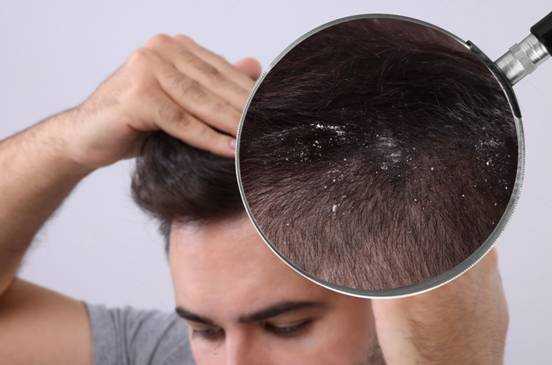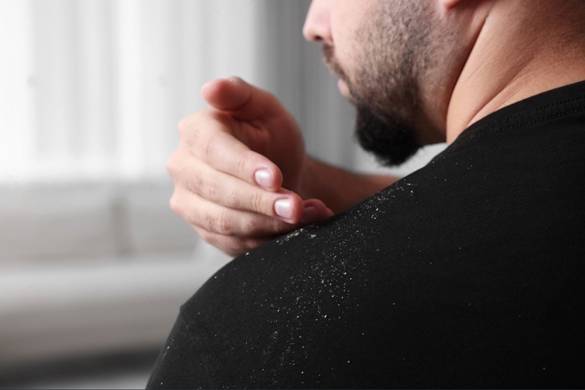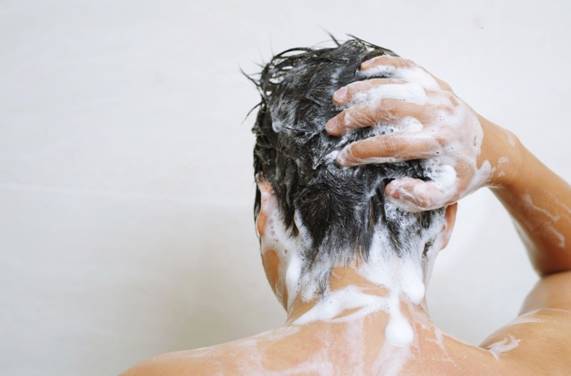Is Dandruff Contagious? The Best Solution For Its Control

Dandruff has a long history of affecting our lives. This scalp condition has been around for thousands of years, and the first-ever case of its symptoms dates back to a 125-million-year-old dinosaur. Like humans, animals also get this condition.
The symptoms and such scenarios raise this question: “Is dandruff contagious?” To answer the question, this article provides some added details, including its symptoms, causes, and how to control it.
Dandruff
It is one of the most common scalp issues. Even with too much familiarity with its symptoms, few people know about its important details. Anyone can be affected by this condition at some point in his/her life. Seborrheic Dermatitis describes “dandruff” in adults and “cradle cap” in children.
In children, the situation is more severe than in adults.
This condition causes a build-up of dead cells on the scalp, forming tiny flakes. The condition is completely harmless unless you see severe symptoms.
It does not need treatment, but those oily or dry flakes falling on the shoulder may cause discomfort or confidence issues in individuals, especially in youth.
Causes and Symptoms
There is no known cause of dandruff. Some factors contribute to its build-ups. However, a yeast called Malassezia is a prime suspect, and studies found a correlation between the presence of yeast and dandruff.
Other factors include environmental factors, harsh weather, harsh products, dry skin, and hormonal changes.
No matter what factor exactly leads to this condition, the symptoms, generally, will be the same:
- Mild inflammation
- Itching
- Redness
- Flakes build-up
- Oily or dry skin
- Crusty patches and scales
- Mild smell on the scalp
These signs indicate you are dealing with dandruff.
Can dandruff spread?

Now, the question is: Is dandruff contagious? That is, can it spread from one person to another? The answer is No. You cannot transfer this condition to others physically or through sharing used items like clothing, accessories, or food.
However, it can spread to the face, eyebrows, and behind the ears of an affected person.
How to control it?
There is no permanent treatment for dandruff. Still, some ways can reduce its symptoms and contribute to stopping its flare-ups. Those ways are:
Manage bath routine
First of all, keep an eye on your bath routine. Dandruff could be dry or oily. Your bath routine depends on your skin type. For oily skin, take daily or more baths to remove excessive oil caused by Malassezia.
If the dandruff is drying the skin or scalp, reduce the bath count to 1 to 2 times within a week.
Taking enough baths or just washing the scalp will significantly help in reducing dandruff.
Bathing will loosen flakes and make it easy to remove them. Also, the build-up of oil and bacteria will clear with regular washing, reducing the risk of infection.
Use a brush
Using a specialized brush to remove dandruff flakes is a great step towards treating it. Gently rub a brush with soft bristles on the scalp to loosen flakes.
You can use it before, during, or after taking a bath. Do not worry if some pesky flakes are not removed with it.
The prime purpose is to lose as many flakes as possible without harming the scalp. Do not rub it hard. The next step is to completely get rid of the remaining flakes.
Use a Medicated dandruff shampoo

Using a medicated dandruff shampoo is the best and complete solution for dandruff control. The combination of shampoo and medicated cream will provide enough moisture to the skin, clean oil, and bacteria build-up, and provide a healthy environment for hair follicles to grow.
Squeeze a small amount and rub it on the scalp for a few minutes. Rinse thoroughly to avoid residue build-up. Use the cream before sleeping and leave it overnight. Wash the next day to clean the scalp.
Preventive measures
You are not done with controlling dandruff without following preventive measures. Prevention is sometimes more effective than treatment. Also, the treatment described in this article may become ineffective if you are careless about dandruff triggers. So, read the measures below and follow them alongside the treatment.
- Do not come in contact with excessive heat and direct sunlight for long.
- Do not scratch your scalp or other affected areas. It will only worsen the condition.
- Never use harsh chemicals. Avoid using hair care and other beauty products.
- Avoid sweating. This will increase the risk of infection.
Conclusions
If the symptoms are moderate, you do not need to worry too much about dandruff. It can spread to other parts of the head and face but not from person to person, meaning that dandruff is not contagious.
You just have to follow some preventive measures and ways to reduce its symptoms. I hope you will follow these guidelines.